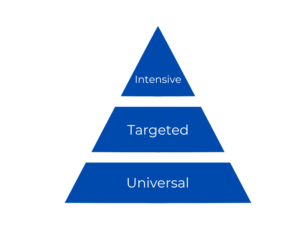What Is MTSS?
MTSS, or Multi-Tiered System of Supports, is a framework that helps educators provide tailored academic and behavioral support to all students. By using regular assessments and interventions, MTSS ensures every student gets the help they need to succeed. This article will explore the components, implementation, and benefits of MTSS.
The MTSS framework provides a structured system of support focused on addressing both academic and behavioral needs through a multi-tiered approach.
Data-driven decision-making is essential for the effective implementation of MTSS, allowing educators to tailor interventions based on continuous assessments of student performance.
Family and community engagement is a critical component of MTSS, fostering collaboration that enhances student support and encourages consistent behavioral expectations.
Understanding MTSS
The MTSS framework serves as a comprehensive system of supports designed to address both academic and behavioral needs of students. It emerged from the need for a unified approach to cater to the diverse learning requirements across different domains. At its core, MTSS focuses on equitable access to educational opportunities, ensuring that all students receive support tailored to their individual needs.
A fundamental aspect of the MTSS process is its proactive approach. Early identification of student needs through regular assessments allows educators to provide timely interventions. This includes a range of support levels, from universal strategies for all students to more intensive interventions for those with significant challenges. The MTSS framework relies heavily on continuous data collection and analysis to assess and adjust the support provided.
Effective MTSS implementation requires collaboration among all stakeholders. Working together and leveraging data, educators make informed decisions that enhance student outcomes. This inclusive approach ensures that every student, regardless of their background or abilities, receives the necessary support educators to thrive in school.
Key Components of the MTSS Framework
This section explores three essential components of the MTSS framework: comprehensive assessment systems, data-driven decision-making, and progress monitoring. These elements work together to enhance student achievement by providing timely academic and behavioral support tailored to individual needs. By focusing on these key components, the MTSS framework ensures that all students receive the necessary interventions to succeed.
Comprehensive Assessment System
The MTSS framework is anchored by several essential components that collectively foster student achievement. A central element is the comprehensive assessment system, which includes universal screening and progress monitoring. Universal screening is conducted thrice annually to identify students who may require additional support, ensuring early intervention for struggling students.
This proactive approach allows educators to identify and support students early, ensuring no student is overlooked. Continuous progress monitoring offers insights into student performance and intervention effectiveness, enabling data-driven decisions to tailor instruction and optimize outcomes.
The assessment system also helps distinguish between students needing short-term support and those who may require special education services, preventing over-identification and ensuring effective resource allocation. By integrating various data sources, such as academic, behavioral, and social-emotional indicators, educators gain a holistic understanding of student needs, promoting a whole-child educational approach.
This system supports an inclusive learning environment that addresses diverse needs, including those of students with disabilities, fostering a supportive school community.
Progress Monitoring
Progress monitoring is another vital element, involving the use of valid tools to evaluate student performance and the effectiveness of interventions. This ongoing assessment is crucial for educators as it facilitates data-driven decisions and allows for the adjustment of interventions based on real-time feedback. By continuously tracking student progress, educators can identify areas where students may be struggling and tailor their instructional strategies to meet those specific needs.
A multi-level prevention system is integral to this process, providing a continuum of academic and behavioral supports that are customized to address the diverse requirements of each student. This system ensures that interventions are not static but evolve as students progress, thereby maximizing the potential for academic and behavioral improvement.
Through regular progress monitoring, educators can swiftly detect when a student is not responding to a current intervention and make necessary changes before the student falls further behind. This proactive approach is essential for maintaining student engagement and ensuring that all students, regardless of their starting point, have the opportunity to achieve their full potential.
Additionally, progress monitoring supports the early identification of students who may require more intensive interventions or special education services. By leveraging data from these assessments, schools can make informed decisions about resource allocation and intervention strategies, ensuring that every student receives the support they need in a timely manner.
Data Driven Decision Making
Data-driven decision-making is central to the MTSS framework, enabling educators to make informed choices about instructional practices and interventions. Continuous data collection and analysis provide insights into student performance, allowing educators to tailor interventions effectively.
This approach supports all students by fostering continuous improvement and achievement. Data-based decision-making ensures interventions are targeted and adaptable, refining strategies based on real-time feedback. It promotes accountability and transparency within the school community by sharing data insights with stakeholders.
Moreover, this approach aids in early identification of students needing additional support, enhancing MTSS effectiveness. It’s not just about collecting data; it’s about using it to create actionable strategies that lead to meaningful improvements in student outcomes, ensuring every student receives the necessary support to thrive academically, behaviorally, and socially.
The Three Tiers of MTSS Support

The MTSS framework is structured around three tiers of support, each providing a different level of intervention based on student needs. This multi-tiered system and system of supports mtss ensure that students receive appropriate support, whether they need universal strategies, targeted interventions, or intensive individualized assistance.
Let’s explore each tier in more detail.
Tier 1: Universal Support for All Students
Tier 1 encompasses universal support strategies designed to help all students. In this tier, 75-90% of students benefit from high-quality core instruction that is evidence-based and may include differentiated support. Universal screening plays a crucial role in this tier, helping to identify students who may need additional academic or non-academic support to support students.
Family engagement is also a key component of Tier 1. Strategies such as family-teacher conferences aim to involve at least 80% of families, fostering a strong partnership between home and school. This collaborative approach helps ensure that students receive the support they need to succeed in their educational journey, laying a solid foundation for future learning.
Tier 2: Targeted Support for Some Students
Tier 2 involves targeted interventions for students who require additional support beyond the universal strategies of Tier 1. These interventions are typically provided in small group settings, allowing for more focused instruction tailored to specific academic and social-emotional needs. The goal of Tier 2 interventions is to help struggling students catch up with their peers.
In Tier 2, data analysis enables educators to design interventions that address students’ specific challenges. Tailored engagement strategies also play a role, focusing on the needs of groups of families who require more support than those receiving universal strategies. This targeted approach ensures that students receive the help they need to succeed academically and socially.
Tier 3: Intensive Support for Individual Students
Tier 3 provides intensive, individualized support for students facing significant challenges. These interventions focus on fundamental skills and are designed to meet the unique needs of each student. In Tier 3, the support is highly personalized, addressing both academic and behavioral issues in a comprehensive manner.
Engagement strategies in Tier 3 are also individualized, targeting a small number of families who require unique support. The ultimate goal of these intensive interventions is to help students progress to the point where they need less intensive support, integrating them more fully into the general education environment.
Successful MTSS implementation in school districts requires a focus on professional development to equip educators with the necessary skills and knowledge. Professional learning sessions promote continuous improvement by encouraging evidence-based practices. Collaborative planning among staff is essential for executing the MTSS framework effectively.
Leveraging MTSS data through collaboration enhances interventions and meets students’ holistic needs. Training staff on the importance of data helps create a data-driven culture within schools, refining educational practices and outcomes. This collaborative, data-informed approach supports both students and educators, fostering a positive school climate.
A comprehensive self-evaluation is the first step in the continuous improvement cycle, helping to identify priorities for action planning. Training behavior staff in techniques like restorative circles and effective communication enhances their ability to manage student behavior positively, further supporting the MTSS framework.
MTSS and Special Education Services
The MTSS framework is designed to provide comprehensive support to all students, including those receiving special education services and special education students. Integration between MTSS and special education supports the principle of the least restrictive environment, ensuring that students with disabilities learn alongside their peers. Collaboration between MTSS and special education leaders can enhance the support provided to students with disabilities education act.
Data-driven decision-making is crucial in this integration, improving instructional practices and identifying students who require special education services. Effective data analysis within MTSS can prevent the over-identification of students for special education. Collaborative professional development opportunities for both special educators and MTSS teams can further improve implementation practices.
The Role of Data in MTSS
Data plays a pivotal role in the MTSS framework, enabling educators to systematically gather and assess information to meet student needs effectively. Key data types include academic performance metrics, behavioral incident records, and attendance and engagement statistics. Access to whole child data is essential for timely decision-making among educators.
Data-informed instruction guides teaching strategies within the MTSS model, ensuring that interventions are tailored to student performance. Regular analysis of data helps identify trends and allows timely adjustments to interventions based on student progress. The continuous improvement cycle involves evaluating data, prioritizing focus areas, planning action steps, and implementing the action plan.
Disaggregating student performance data allows for the evaluation of MTSS effectiveness, ensuring equitable outcomes for all students. This comprehensive use of data supports the goal of the MTSS framework to provide targeted, effective interventions that enhance student achievement.
Promoting Positive Behavioral Outcomes
Promoting positive behavioral outcomes is an integral part of the MTSS framework. Positive Behavioral Interventions and Supports (PBIS) are critical to MTSS success, including schoolwide expectations, tiered systems of support, and consistent data analysis. Behavioral interventions within MTSS may involve strategies like positive reinforcement and established routines to address students’ behavioral challenges.
PBIS helps build a positive school culture, addressing behavioral issues in a proactive way. Focusing on positive reinforcement and clear expectations, PBIS encourages students to develop appropriate behaviors, contributing to a supportive learning environment.
Engaging Families and Communities
Engaging families in the MTSS process enhances student support and promotes consistency between school and home. Families play critical roles in a multi-tiered system, including being designers and evaluators of the support systems in place. A successful family engagement strategy adapts to the varying needs of families through a flexible, multi-tiered approach.
Collaboration among all adults interacting with students fosters a consistent approach to behavior expectations and intervention. A multi-tiered approach to family engagement encourages schools to proactively create opportunities for all families to participate meaningfully in the school community.
Establishing metrics to evaluate engagement strategies ensures that schools can adapt based on family feedback, continuously improving their approach.
PDSA (Plan-Do-Study-Act) cycles facilitate learning from data, moving from small-scale tests to broader implementations as part of continuous improvement in the MTSS framework. Action planning is crucial for identifying priorities and implementing effective interventions.
Data-driven dialogue protocols are essential for assessing and improving MTSS practices. Regularly evaluating data and adjusting strategies ensures the MTSS framework remains effective and responsive to student needs. This continuous improvement process supports the goal of providing high-quality, equitable education for all students.
Supporting the Whole Child Through MTSS
The MTSS framework emphasizes the importance of supporting the whole child, addressing academic, behavioral, and social-emotional needs. Integrating various supports, including social-emotional, behavioral, and academic interventions, MTSS offers a comprehensive approach to student development. Effective behavior staff can shift focus from punitive measures to a proactive system centered around student support and skill-building.
Restorative practices within MTSS allow students to recognize the impact of their actions and work towards repairing relationships harmed by their behavior. This focus on relationship building is key for student success, creating a supportive atmosphere that fosters learning and growth. A positive school climate significantly affects student outcomes. This includes enhanced academic achievement and a decrease in discipline referrals.
A supportive school environment helps students navigate challenges. This approach enables them to catch up with their peers and ensures that every student has the chance to succeed. MTSS addresses the challenges of providing tailored support to students, especially when students struggle, by integrating tiered interventions, promoting a holistic approach to education.
The Future of MTSS
In summary, the MTSS framework provides a comprehensive, data-driven approach to supporting every student in their academic, behavioral, and social-emotional development. By implementing a multi-tiered system of supports, schools can ensure that all students receive the interventions they need to succeed.
The transformative potential of MTSS lies in its ability to create an inclusive, supportive educational environment. By focusing on continuous improvement and engaging families and communities, MTSS promotes positive outcomes for all students. Embracing this framework can lead to significant advancements in student achievement and well-being.
Frequently Asked Questions Around MTSS
What is MTSS?
MTSS, or Multi-Tiered System of Supports, is a structured framework that aims to meet the diverse academic, behavioral, and social-emotional needs of all students through a tiered system of interventions. This approach ensures that support is allocated based on individual student requirements.
How does MTSS support students with special education needs?
MTSS supports students with special education needs by integrating specialized services and providing data-driven interventions in a least restrictive environment, allowing these students to learn alongside their peers effectively. This approach ensures that their unique needs are addressed comprehensively.
What role does data play in MTSS?
Data is crucial in MTSS as it guides decision-making and intervention strategies, facilitating the identification of student needs and the assessment of intervention effectiveness. Continuous data collection and analysis ensure that instructional practices are informed and tailored to support all students effectively.
How are families involved in the MTSS process?
Families play a vital role in the MTSS process by collaborating with schools through strategies such as family-teacher conferences and tailored engagement initiatives. This partnership fosters consistency and support between home and school environments.
What are the three tiers of support in MTSS?
The three tiers of support in MTSS are Tier 1, which offers universal support for all students; Tier 2, providing targeted support for some students; and Tier 3, delivering intensive support for individual students. Each tier is designed to address varying levels of student needs effectively.



